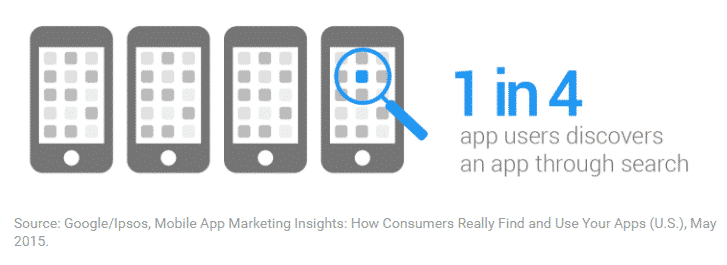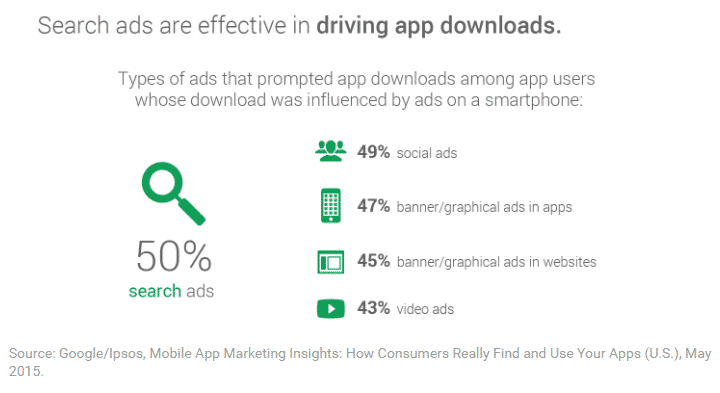Building an app for your local business, or building local content into your app makes a lot of sense for many businesses. Why? The mobile market is becoming increasingly dominant with app usage having grown 90% since 2013 according to Comscore.
Understanding how local mobile apps are developing along with increasing mobile use is key. It makes sense: you need locally based content so mobile users can find it when they’re nearby. Savvy companies are using new technology to find, contact, and deliver an experience to local users like never before.
One of the big challenges for creators of local apps is not just getting them found, but getting them found by the local audience they are targeted at. There is a lot of “noise” in the app space and you’re competing in the clamour for attention with the big names.
What can you be doing to market your local app?
Android Nearby
One of the hot new developments of the Android space has been the recent announcement of their new “Nearby” feature. For developers of Android apps, this is a great tool to keep in mind when you’re considering how you will market your local app.
The Nearby feature works by notifying Android users of things that may be useful to them nearby, including local apps. For example, if you are near the University of Notre Dame you might be invited to tour historic landmarks, if you are at The Broad in LA, you might be invited to download their app and take an audio tour.
These proximity-based experiences are another way of offering more relevant content to an audience that wants it, with “user choice” being the key here. Just because someone is nearby with an Android phone doesn’t necessarily mean they will be notified of your app. Users have the choice to opt in to receiving these notifications by turning on Bluetooth and Location. If they’ve opted in and receive notifications they are not interested in, they simply swipe them away.
How does this work for your app?
If you’ve got a local Android app, you need to have set it up so that you’re able to take advantage of Nearby. Google’s developer blog has the details; basically, you will need to invest in some Eddystone Beacons which you then configure to point to your desired experience.
Obviously, this is a great initiative for local app developers wanting to draw more attention to their Android app and could provide quick wins by taking advantage of technology. However, given that receiving notifications or having location enabled at all is optional, you’ll need some other ways to market your app to a local audience too.
App Indexing
App indexing is not so much about marketing, but getting your app found in searches — like SEO, except for apps. Why does this really matter for local apps? Research from Think With Google tells us that one in four app users discovers an app through search, while discovery via search is particularly prominent for local apps.

First up, here’s a “watch this space” for app indexing which you should be aware of.
Google began testing several months ago on indexing app-only content according to Search Engine Land. What this means is that if someone were to search, say for a nearby Thai restaurant, Google might show them in-app content results, even if there is no corresponding website content.
There are a few catches at the moment: if users are searching in Chrome, they will only see the app-only content results for those apps which they have already downloaded. If they are using the Google search app, they will see in-app content results as Google is testing out “streaming” of apps — where people can jump to the app content even if they haven’t got the app downloaded.
Other catches are that the apps involved are only a select group at present (Hotel Tonight and Weather Channel are among them) and it is only Android apps and for searches on Android phones. This could, of course, be expanded in the future for iOS and for more apps if their testing goes well.
Other app platforms are not to be left out — look out for Apple App Search (which was actually around first) and which allows developers to feed information into Spotlight and Safari search results.
Facebook’s AppLinks is another platform to be aware of when looking at getting your app found in search. This allows “deep linking” from app to app in the same way that web pages can link together.
In every case, you need to be set up to allow the links, so check the requirements on their pages.
Getting found on Google
Most of us can rule out getting found for app-only content until this is rolled out further, but keep an eye on developments so you can get in if and when it becomes available. In the meantime, you need to have app content associated with a web page to be indexed. Here’s how you can still ensure you appear in Google results:
- You need to correctly implement “deep linking” for apps which have corresponding web content. For example, the app for your local cafe may be linked to the company website. (If your app is for iOS, you need to support Universal Links. Android apps need to be registered with Google and associated with your website).
- You need to implement Google App Indexing. For iOS, you need to integrate App Indexing SDK, for Android use the App Indexing API for Android.
- Web pages need to be explicitly mapped to their corresponding app screens.
Paid Promotion
If you’re serious about getting app downloads, then you need to be wherever mobile users are looking to discover apps and content of interest. Paid promotion works through various channels where mobile users can be found — just see the statistics from Think With Google below:

Paid promotion can be a great idea, even if you don’t have a large budget for it in the beginning. If you can target ads well and achieve downloads, the higher rate of downloads can push up your ranking in the corresponding app store, leading to further downloads.
As a local app, Facebook Ads for Apps should be high on your list. Why? Facebook remains one of the best advertising sources for drilling down an audience and driving highly targeted traffic. This means if your app pertains to your relatively small area, you can state geographic location in your ad setup and avoid showing your ad to too many to whom it will be irrelevant.
Adwords Mobile App Install Campaigns is another good advertising source. While it won’t be as targeted geographically, you can use local search terms in your keywords which can help narrow it down. Adwords will find the most likely customers based on stated operating system.
Twitter App Cards are a newer medium and will represent your app via a “card” on Twitter to drive installs. Like Facebook, you can target your Twitter ads to demographics and geographic locations. You might also use look-alike or tailored audiences.
While those are some of the common places to create paid ads, as a local app, you shouldn’t rule out the classic banner ad on a website. If you have popular local websites, there may be an opportunity for you to get in front of locals by paying for some ad space. Your local Chamber of Commerce or events websites are good places to check.
Final Thoughts
Like any other business venture you’ve invested time, money and effort into, you need to devote energy to effectively marketing your local app if you want to make it a success. There are over 3 million mobile apps available for download, how will you ensure yours is found?
New technology is here to help local marketers, with beacon enablement giving you the option of pushing notifications out to potential users, while you should also ensure you’ve taken advantage of app indexing measures where you can.
Finally, get your app out to more local users by investing in some well-targeted paid advertising strategies. Look for ways to narrow down your audience and target only the most likely users.
Koombea creates beautiful, engaging apps for local businesses. Check in with us today and see how we can help you.
